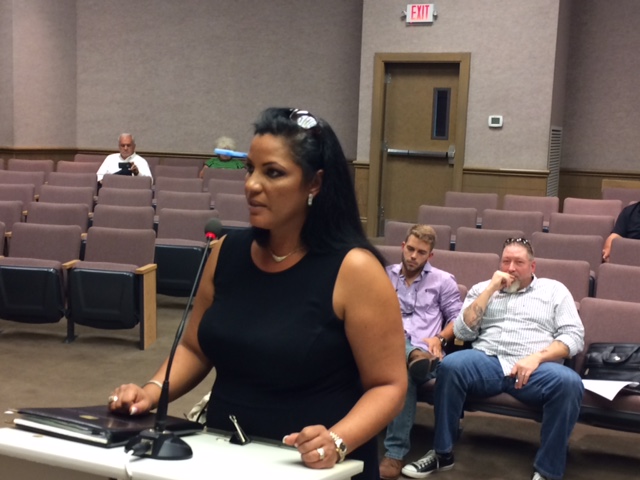
Karen Shostak speaks to the East Ridge Beer Board regarding the prospect of special event beer sales in Camp Jordan, Monday at City Hall.
The East Ridge Beer Board wants the City Council to reconsider the prohibition of beer sales on city property.
On Monday during a special called meeting at City Hall, the Beer Board voted 4-0 to recommend that the council amend an ordinance which outlaws selling beer at Camp Jordan Park.
Gregg Shipley, the Beer Board member who is spearheading the effort, said the idea behind beer sales in Camp Jordan, which would require a special permit, is to bring bigger events to the park and generate additional income for the city.
Shipley invited Karen Shostak – a business owner who specializes in training beer servers, member of the Hamilton County Beer Board and involved with Friends of the Festival – to brief the board on how special events beer sales in Camp Jordan could be handled.
The city would first establish an application process that would set time frames for the permit, a fee structure and designate city staff that would oversee the process. Guidelines could be implemented on when and where the sales would be made. She urged establishing an “events checklist,” which would be tantamount to an “interview” of the producer of the event. The checklist would include who would be distributing beer and what kind of training they have received.
Shostak, who has worked with the City of Chattanooga on special events that serve alcohol since 2007, said that the priority must be on “safety and security.” A special permit for beer sales would enable the city to enforce rules uniformly.
“On a personal note, when you introduce alcohol it will attract certain events,” Shostak said. “It’s an amenity (event producers) would like to offer their adult patrons.”
Last year one of those event producers was Travis Drew, who brought “Tattoonooga” to Camp Jordan Park. Drew said it was the biggest tattoo festival in the south which brought thousands of people to East Ridge pumping a great deal of money into the local economy. He said many people attending Tattoonooga were asking why they couldn’t get a cold beer at the event.
“I want to open the door (to beer sales in the park),” he told the board. “I’d like to see this happen.”
Board members Charlie Snyder and Carnell Storie voiced concerns over security and liability issues with special events where alcohol is served.
Shostak explained that the person or entity which obtains the permit would be responsible for the cost of insuring the event and would add the city as an “additionally insured.” She said there is no formula for how many police officers may be required to insure security, but that could be augmented with the event producer paying for extra security personnel.
In addition, the event producer would be responsible for the training of beer servers and any and all compliance issues.
“Starting out, with Camp Jordan having this amenity (beer sales), it should be simple, easy to follow rules,” Shostak told the board. “This park has so much potential for really wonderful events.”
There was discussion of an existing contract that the city has with Fun Time Foods giving them exclusive rights for concession sales in Camp Jordan.
Howard Hale, a principal with Fun Time Foods, said he didn’t want to “get into the what-ifs,” and that it was premature to discuss details of how beer sales might effect his business. Hale said that he believed beer sales would be “good for the city,” attracting more events that would be better attended.
“Everybody’s got to be happy in the long run or it won’t work,” he said.
Former City Councilman Denny Manning railed at members of the Beer Board and implored them to reject the idea of selling beer during special events. Manning said that when the park was donated to the city many years ago a provision in the deed prohibited alcohol from ever being sold in the park. He noted that the document stating such, “got lost.”
In regard to the myriad details of how special permit sales of beer in the park may work, Shipley said that the board “may have gotten the cart before the horse,” as the City Council must amend the current ordinance if the issue is to move forward.
